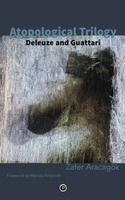Atopological Trilogy: Deleuze and Guattari
| dc.contributor.author | Aracagök, Zafer | |
| dc.contributor.editor | Antonioli, Manola | |
| dc.date.accessioned | 2019-03-26 23:55 | |
| dc.date.accessioned | 2020-01-23 14:09:07 | |
| dc.date.accessioned | 2020-04-01T10:42:23Z | |
| dc.date.available | 2020-04-01T10:42:23Z | |
| dc.date.issued | 2015 | |
| dc.identifier | 1004570 | |
| dc.identifier | OCN: 945783209 | en_US |
| dc.identifier.uri | http://library.oapen.org/handle/20.500.12657/25525 | |
| dc.description.abstract | Atopological Trilogy creates new concepts for Deleuze-Guattarian thought without any heed for sectarian, sermonising, or dutiful readings of the philosophers. In Part I of the trilogy, “Becoming-Sexual of the Sexual,” Aracagök demonstrates the ways in which quantum theory and the concept of “complementarity” inform Deleuze and Guattari’s thought, especially in relation to “becoming” in general and “becoming-woman” and “becoming-queer” more particularly. Aracagök argues that the ways in which the philosophers put forward a ban on “becoming-man” with a certain degree of undecidability encapsulates (albeit in a cryptic form) other becomings, the most important of which is becoming-queer, or rather, the becoming-sexual of the sexual. In Part II: “Deleuze on Sound, Music, and Schizo-Incest,” Aracagök puts into resonance the sound, noise, and music (and the question) of schizo-incest with the intention of deterritorialising a notion of the meta-audible. If Kafka’s story, “The Investigations of a Dog” leads us to a realm of the “formless” which cannot be heard without destroying what we know as “hearing,” it also offers us a limit-experience of the meta-audible, which, when radicalised via the notions of “schizo-incest” and “self-shattering,” creates a line of flight that escapes even from the line of flight itself. All these maneuvers pose a serious challenge to Deleuze and Guattari, who claim that despite all his investigations, Kafka’s investigator dog is re-Oedipalised in the end. Proposing in the end a limit experience which Aracagök calls the “meta-audible,” he shows that Kafka’s more radical approach to sound creates a line of flight that escapes even from the line of flight itself | |
| dc.language | English | |
| dc.subject.classification | thema EDItEUR::Q Philosophy and Religion::QD Philosophy::QDH Philosophical traditions and schools of thought::QDHR Western philosophy from c 1800 | en_US |
| dc.subject.other | psychoanalysis | |
| dc.subject.other | cultural studies | |
| dc.subject.other | Gilles Deleuze | |
| dc.subject.other | noise | |
| dc.subject.other | Felix Guattari | |
| dc.subject.other | perversion | |
| dc.title | Atopological Trilogy: Deleuze and Guattari | |
| dc.type | book | |
| oapen.identifier.doi | 10.21983/P3.0096.1.00 | |
| oapen.relation.isPublishedBy | 979dc044-00ee-4ea2-affc-b08c5bd42d13 | |
| oapen.relation.isbn | 9780692403723 | |
| oapen.collection | ScholarLed | |
| oapen.pages | 90 | |
| oapen.place.publication | Brooklyn, NY | |
| oapen.identifier.ocn | 945783209 |

